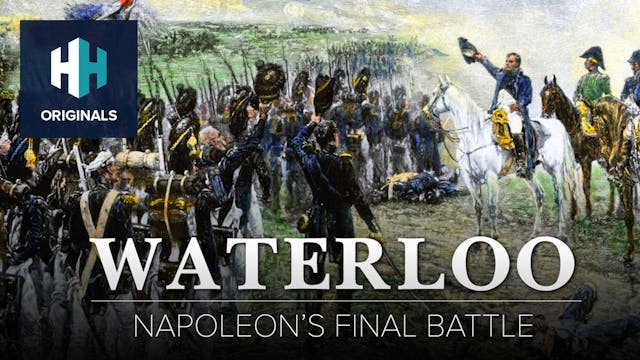During the Napoleonic Wars the British Army experienced a time of rapid change. At the beginning of the French Revolutionary Wars in 1793, the army was a small, awkwardly administered force of barely 40,000 men. By the end of the period, the numbers had vastly increased to over a quarter of a million soldiers by 1813.
Whilst the battlefields of the early 1800s looked similar to those of centuries gone by, with columns of infantry advancing slowly toward the enemy musket volleys, the British army was starting to diversify, adding specialised and elite units to its forces.
In this video, History Hit presenters Luke Tomes and Louee Dessent join the Coldstream Guards 1815 and 95th Rifles - reenactment groups representing real units that served in the Peninsular War and helped to defeat Napoleon at the Battle of Waterloo…
Together, they'll find out how your regiment in the Duke of Wellington’s army would shape your experience on the battlefield and determine your chances of survival.
Taking up the role of a 'redcoat' line infantryman, Louee is thrown in the deep-end as he joins a marching drill crash course, before firing a brown bess musket.
Meanwhile, Luke is taken through the unique light infantry skirmishing tactics used by the green jackets during the Napoleonic Wars, before firing the famous baker rifle and learning how to make musket balls from scratch.
Will Louee survive his drill training? Will Luke be able to fire 3 rounds per minute? Watch the video to find out!
Filmed at the Living History UK Festival 2023.
Up Next in Napoleon
-
St Helena: Napoleon's Last Battlefield
Napoleon was one of the most significant soldiers and statesmen in world history. And his last years spent on the remote island of St Helena only adds to the fascination of his story.
Dan Snow visits the key sites on St Helena, linked to Napoleon's stay on this island. St Helena has been COVID ...
-
The Uniform of the British Army
The British Army is one of the world’s most experienced fighting forces. From Blenheim to Waterloo, from Balaclava to the Somme, it has played its part in the history’s most bloody conflicts. But as these troops executed Herculean tasks in the worlds harshest terrains, what were they wearing? How...
-
Waterloo: Napoleon's Final Battle
In Spring of 1815 the exiled Napoleon Bonaparte, one of history's most accomplished generals, escaped his jailers and returned to Paris in what is known as the 'Hundred Days'. After receiving the news, the powers of Europe formed the Seventh Coalition to remove Napoleon from the French throne and...




1 Comment